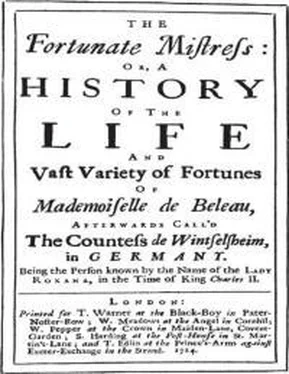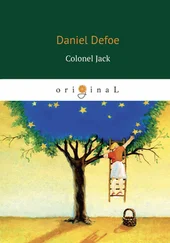However, I came home from them all without any Relief, and went on at home till I was reduc’d to such inexpressible Distress, that it is not to be describ’d: I had been several times after this at the old Aunt’s; for I prevail’d with her to promise me to go and talk with the other Relations; at least, that, if possible, she could bring some of them to take off the Children, or to contribute something towards their Maintenance; and, to do her Justice, she did use her Endeavour with them, but all was to no Purpose, they would do nothing, at least that Way: I think, with much Entreaty, she obtain’d by a kind of Collection among them all, about eleven or twelve Shillings in Money; which, tho’ it was a present Comfort, was yet not to be nam’d as capable to deliver me from any Part of the Load that lay upon me.
There was a poor Woman that had been a kind of a Dependant upon our Family, and who I had often, among the rest of the Relations, been very kind to; my Maid put it into my Head one Morning to send to this poor Woman, and to see whether she might not be able to help, in this dreadful Case.
I must remember it here, to the Praise of this poor Girl, my Maid, that tho’ I was not able to give her any Wages, and had told her so, nay I was not able to pay her the Wages that I was in Arrears to her, yet she would not leave me; nay, and as long as she had any Money, when I had none, she would help me out of her own; for which, tho’ I acknowleg’d her Kindness and Fidelity, yet it was but a bad Coin that she was paid in at last, as will appear in its Place.
AMY , (for that was her Name) put it into my Thoughts to send for this poor Woman to come to me, for I was now in great Distress, and I resolv’d to do so; but just the very Morning that I intended it, the old Aunt, with the poor Woman in her Company, came to see me; the good old Gentlewoman was, it seems, heartily concern’d for me, and had been talking again among those People, to see what she could do for me; but to very little Purpose.
You shall judge a little of my present Distress by the Posture [37] Posture : situation, condition.
she found me in: I had five little Children, the Eldest was under ten Years old, and I had not one Shilling in the House to buy them Victuals, but had sent Amy out with a Silver Spoon, to sell it, and bring home something from the Butcher’s; and I was in a Parlour, sitting on the Ground, with a great Heap of old Rags, Linnen, and other things about me, looking them over, to see if I had any thing among them that would Sell or Pawn for a little Money, and had been crying ready to burst myself, to think what I should do next.
At this Juncture they knock’d at the Door, I thought it had been Amy , so I did not rise up, but one of the Children open’d the Door, and they came directly into the Room where I was, and where they found me in that Posture, and crying vehemently, as above; I was surpriz’d at their coming, you may be sure, especially seeing the Person I had but just before resolv’d to send for: But when they saw me, how I look’d, for my Eyes were swell’d with crying, and what a Condition I was in as to the House, and the Heaps of Things that were about me, and especially when I told them what I was doing, and on what Occasion, they sat down like Job’s three Comforters, [38] like Job’s three Comforters : Job 2:11 – 13.
and said not one Word to me for a great while, but both of them cry’d as fast, and as heartily as I did.
The Truth was, there was no Need of much Discourse in the Case, the Thing spoke it self; they saw me in Rags and Dirt, who was but a little before riding in my Coach; thin, and looking almost like one Starv’d, who was before fat and beautiful: The House, that was before handsomely furnish’d with Pictures and Ornaments, Cabinets, Peir-Glasses, [39] Peir-Glasses : pier-glasses, or large mirrors, so-called because designed to fill the pier, the space between a pair of windows.
and every thing suitable, was now stripp’d, and naked, most of the Goods having been seiz’d by the Landlord for Rent, or sold to buy Necessaries; in a word, all was Misery and Distress, the Face of Ruin was every where to be seen; we had eaten up almost every thing, and little remain’d, unless, like one of the pitiful Women of Jerusalem , [40] the pitiful Women of Jerusalem : Lamentations 2:20. But the allusion may owe something to Josephus’s account of the woman who ate her child during Titus’s seige of Jerusalem. See his History of the Jewish War , Book VI, Chapter 3.
I should eat up my very Children themselves.
After these two good Creatures had sat, as I say, in Silence some time, and had then look’d about them, my Maid Amy came in, and brought with her a small Breast of Mutton, and two great Bunches of Turnips, which she intended to stew for our Dinner: As for me, my Heart was so overwhelm’d at seeing these two Friends, for such they were, tho’ poor, and at their seeing me in such a Condition, that I fell into another violent Fit of Crying; so that, in short, I could not speak to them again for a great while longer.
During my being in such an Agony, they went to my Maid Amy at another Part of the same Room, and talk’d with her: Amy told them all my Circumstances, and set them forth in such moving Terms, and so to the Life, that I could not upon any Terms have done it like her myself, and in a Word, affected them both with it in such a manner, that the old Aunt came to me, and tho’ hardly able to speak for Tears: Look ye, Cousin, said she, in a few Words, Things must not stand thus; some Course must be taken, and that forthwith; pray where were these Children born? [41] where were these Children born ?: Responsibility for deserted children and the poor, by the Law for the Better Relief of the Poor (1662, also called the Law of Settlement and Removal), lay with the parish in which they had a legal settlement, that is, an established residence (generally, where they were born). Consequently, children and paupers were often sent back to their birthplaces for maintenance. Before 1662 all poor people were entitled to relief wherever they were living. See also note 37.
I told her the Parish where we liv’d before, that four of them were born there; and one in the House where I now was, where the Landlord, after having seiz’d my Goods for the Rent past, not then knowing my Circumstances, had now given me leave to live for a whole Year more without any Rent, being moved with Compassion; but that this Year was now almost expir’d.
Upon hearing this Account, they came to this Resolution: That the Children should be all carried by them to the Door of one of the Relations mention’d above, and be set down there by the Maid Amy , and that I, the Mother, should remove for some Days, shut up the Doors, and be gone; that the People should be told, That if they did not think fit to take some Care of the Children, they might send for the Church-Wardens if they thought that better; for that they were born in that Parish, and there they must be provided for; as for the other Child which was born in the Parish of —, that was already taken Care of by the Parish-Officers there; for, indeed, they were so sensible of the Distress of the Family, that they had, at first Word, done what was their Part to do.
This was what these good Women propos’d, and bade me leave the rest to them. I was at first, sadly afflicted at the Thoughts of parting with my Children, and especially at that terrible thing, their being taken into the Parish-keeping; and then a hundred terrible things came into my Thoughts; viz . of Parish-Children being Starv’d at Nurse; of their being ruin’d, let grow crooked, lam’d, and the like, for want of being taken care of; [42] for want of being taken care of : The care of children by the parish officers was notoriously callous. It is thought that in the seventeenth century less than a quarter of all ‘parish’ children survived, but even this rate of survival was better than the rate of survival of workhouse children in the eighteenth century.
and this sunk my very Heart within me.
Читать дальше











